- CICASP Staff
- Students
- Alumni
CICASP Staff
Ikuma Adachi

Ikuma Adachi
Associate Professor, Head of CICASP
Yuko Hattori
I am interested in how individuals develop and maintain good relationships in their social environments, and what kinds of communication are used while they interact with each other. Currently, I am focusing on behavioral synchrony and body movement matching in chimpanzees with respect to how these behaviors affect their social relationships. I'm also interested in the evolutionary origins of human musical activities such as dancing and singing.

Yuko Hattori
Assistant Professor
Susumu Tomiya
I study the evolutionary history of mammals to better understand how their diversity is generated, maintained, or lost at various scales of time (hundreds to millions of years) and space (local to continental). I am also passionate about taking care of natural history collections that enable such research, and biology education.

Susumu Tomiya
Program-specific Assistant Professor
Noe Yoshida
Everyone at CICASP is friendly and warm, and I am happy to be a member of the team. I am surrounded by people from many different countries and enjoy getting to know them. If you are feeling anxious about starting a new life in an unfamiliar environment, please do not worry! I understand how hard it can be to adjust and settle into a new place, and I will be here to assist you so that you can concentrate on your work or study. I look forward to welcoming you at CICASP.

Noe Yoshida
Administrative Staff Member
Students
MN Fitri Suhaimi
I have always been fascinated by how different primate species manage to share the same habitat in the wild. What allows them to live side by side without outcompeting each other? What are the cons and pros? To answer this, I've turned my research focus to the one of the hotspot of primate diversity, the Lower Kinabatangan region in Sabah, Malaysian Borneo.
MN Fitri Suhaimi
Master's Student
Amos Chua
My research focuses on the behavioural ecology and genetic diversity of an endangered subspecies of long-tailed macaque endemic to the Con Dao archipelago, Vietnam—Con Song long-tailed macaque (Macaca fascicularis condorensis). It is highly threatened by urban and coastal development, human-wildlife conflict, genetic isolation, illegal captures and potentially traps. However, despite its threatened state, there is very little progress in conservation actions and no baseline data exist on its basic ecology, behaviour, population, or genetics. Hence, my research is important for gathering and establishing basic information on an understudied population. These pieces of information will help to develop effective conservation measures and research activities in the future. Additionally, the findings will advance scientific knowledge and update the state of the subspecies in conservation action plans, IUCN Red List and CITES.

Amos Chua
Master's Student
Michihiro Yagami
Hylobatids (gibbons and siamangs) are known for unique vocal behaviors, called “songs,” in which they repeatedly and loudly change their pitches. They use the loud songs to project their voices far away, even in dense tropical forests, where the sounds are well absorbed. Why can they “sing” so differently from other primates? Their vocal fold must be stretched and stretched repeatedly for a long time to produce the drastic pitch changes in their songs. I expected that their inner-laryngeal muscles have morphological features to move the vocal fold effectively. In my study, I focused on the inner-laryngeal muscles involved in the elongation of the vocal fold in hylobatids and compared them with those of other primates to clarify their morphological characteristics.

Michihiro Yagami
Master's Student
Casey Mack
My current research focuses on the ecology of critically endangered Bornean orangutans in the Kinabatangan floodplain. I am investigating the relationships between gut microbiome composition, parasite transmission, and kinship dynamics, and how they are influenced by human disturbance—particularly land use conversion and habitat fragmentation. By integrating behavioral, ecological, and molecular data, I aim to better understand how anthropogenic pressures impact orangutan health, social structure, and long-term survival. I’m passionate about wildlife conservation and environmental education, I strive to bridge scientific research with impactful outreach. When I’m not in the lab or the field, I’m chasing adventure—exploring nature, cultures, and new perspectives.

Casey Mack
Master's Student
Sakura Hayashi
Hi! I am an M1 student in the Cellular Biology section. While working as a TA,
I want to learn about various research projects and hear interesting ideas from everyone this year.
My ongoing research theme is: What is the genetic change that made owl monkeys nocturnal?
I'm interested in the distribution of heterochromatin in photoreceptor nuclei of nocturnal mammals.

Sakura Hayashi
Doctoral Student
Momoka Suzuki
Do you know that there are many species of marine mammals in the water around Hokkaido, Japan? We can see cetaceans (e.g. killer whales, sperm whales, minke whales), pinnipeds (e.g. spotted seals, harbor seals, ringed seals, northern fur seals, steller sea lions), and sea otters. They have relationships with humans—for example, whale watching for sightseeing and conflict with humans in fishery. However, most of the species of marine mammals inhabiting Hokkaido are not sufficiently studied, so we have not been able to establish appropriate conservation strategies yet. Therefore, I am researching them, and my research theme is on genomic analysis of various species of marine mammals which we can see in Hokkaido. The purposes of this study are to assess their extinction risk and predict their response for recent and future climate changes. I hope we can still see them in the future, 100 years from now.
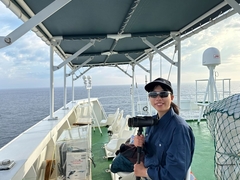
Momoka Suzuki
Doctoral Student
Sanjana Kadam
Several psychiatric disorders such as schizophrenia, addiction, and major depressive disorder have been suggested to involve cognitive biases in their symptoms, but their mechanistic relatioships have remained largely unclear. To provide insights on the issue, I investigate social and affective aspects of cognitive biases. In particular, I examine how affective states of subjects may influence their habits, and its relevance to addiction in order to improve our understanding of the mechanisms of psychiatric disorders.

Sanjana Kadam
Doctoral Student
Haruka Shima
My research focuses on understanding the unique sleep mechanisms that marine mammals have developed through adaptation to aquatic environments. In particular, I am interested in the sleep behavior of fur seals. They have evolved a distinctive way of sleep while floating on the sea surface. By observing captive fur seals, I aim to clarify the evolutionary significance of their sleep posture, as well as the daily patterns and flexibility of their sleep.
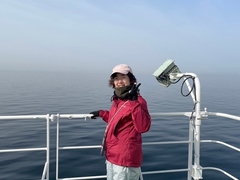
Haruka Shima
Master's Student
Yuka Goto
My research focuses on naked mole-rats, a unique eusocial mammal species exhibiting a highly organized social structure. I am particularly interested in the development of division of labor, including reproductive specialization and cooperative roles such as foraging and colony defense. Additionally, I also want to explore their use of vocal communication, which plays a crucial role in maintaining social cohesion and coordinating group behavior. By investigating these aspects, I aim to understand the mechanisms that support eusociality in naked mole-rats and to gain broader insights into the evolution of complex social systems in mammals.

Yuka Goto
Master's Student
Alexander Hendry
I am a master's student based at the Wildlife Research Center at Kyoto University. For my masters project I am investigating the bark stripping behaviour of black and white colobuses (Colobus guereza) and eastern chimpanzees (Pan troglodytes schweinfurthii) in the Kalinzu Forest Reserve of Uganda. My goal is to determine which of three competing hypotheses best explains why these two different primate species consume bark. My aim is for this research to help prevent human-wildlife conflict arising as a result of primates feeding within eucalyptus plantations in East Africa.

Alexander Hendry
Master's Student
Brenda de Groot
I study leaf-eating monkeys called lutungs, or langurs (Trachypithecus spp.). These elusive primates live in limestone karst mountains and tropical forests throughout East and Southeast Asia, and are known for their egalitarian societies and strikingly orange infants. Most lutungs are severely threatened with extinction, while their lives and minds remain largely a mystery. To tackle both challenges, I study their social lives and communication. I focus in particular on their interactions with and around infants, whom they collectively care for, to better understand the emotions, cognition, and social norms that underlie these interactions.
Brenda de Groot
Doctoral Student
Mare Adachi
I am Ph.D. student in Ecological science. I am studying how much water primates need in a day.
Water is essential for life. Even though drinking behavior is a basic physiological behavior, it has not been well studied. We do not know the exact water intake of each primate species. In addition, little is known about the cleanness of water drinking sites in the wild. To solve all those problems, my aim is to determine the daily fluid intake of captive and wild primates, and to find out how hygienic the water they are drinking is.

Mare Adachi
Doctoral Student
Jungmin Oh
Key words of my interest & research
-The generative circuit of emotion in the brain
-Emotional Disease (General Anxiety Diseases / Depression / Addiction)
-Approach-Avoidance conflict
-Nucleus accumbens and Substantia nigra
-Electrophysiology and DREADDs using viral vector

Jungmin Oh
Doctoral Student
Isa Walker
I am currently investigating how climate and environmental change shape the feeding ecology and behavior of Bornean orangutans. My work explores the links between ecosystem biodiversity and immune function by examining differences in diet composition and inflammation levels among individuals living in disturbed versus less-disturbed forest habitats.
I am passionate about approaching science and conservation through creative, interdisciplinary perspectives, and I hope to help bridge gaps in science communication by integrating art, music, and creative writing into my work. As a new master’s student, I am excited to embark on this research journey and look forward to beginning fieldwork soon!

Isa Walker
Master's Student
Kasia Majewski
My present work focuses on the invasive raccoon dogs of Yakushima Island, a biodiversity rich UNESCO World Heritage Site in southern Japan. I am investigating the population dynamics of this prolific invasive on the island, as well as their role in affecting the fragile native environment through:
- predation of endemic and endangered species (i.e. loggerhead sea turtles)
- competition for food with the only native small carnivore on the island - the endemic subspecies of Yakushima weasel,
- the spread of infectious lung worms (trematodes).

Kasia Majewski
Doctoral Student
Azhari Fadel Abdurrahman
I study the genetics of endangered animals to help practitioners devise efficient conservation strategies. Currently, my target species is the white-tailed eagle, which is considered endangered in Japan. Because the species is facing low reproductive success, mixing of populations from different regions might be needed in the future. The data generated by this research will give insights into the feasibility of such interventions.
My personal goal is to master various methodologies in conservation genetics and gain experience in working across different taxa of animals to have a holistic understanding, both in theory and practice, of preventing extinction from the genetic perspective.

Azhari Fadel Abdurrahman
Doctoral Student
Sarv Dashti
My main research interest is non-human animal’s understanding of death. Chimpanzees are our closest living relatives and that makes them an important subject to study the evolutionary origins of traits we might assume uniquely human, like thinking about death. Do they wonder about dying and what happens after? Do they understand the irreversibility of it? While observing primates in the wild is a great way of studying their interaction with dead and dying animals, experimental research is necessary to control as many variables as possible. Still, studying such abstract subjects in non-linguistic animals is very challenging. I am currently working with chimpanzees staying at EHUB and my goal is to help our understanding of what they know and feel about death.

Sarv Dashti
Doctoral Student
Xorlali Azimey
Grasscutter (Thryonomys swinderianus) meat is a highly valued delicacy in Africa, especially in Ghana, yet it is mostly sourced from the wild using unsustainable methods that harm ecosystems and threaten the species. As domestication efforts remain early-stage, farmers face challenges like aggression, injury, and mortality among captive animals. My research explores the genetic basis of grasscutter behaviour to support selective breeding for docility. By identifying key genetic polymorphisms, this study aims to improve domestication, ensure sustainable meat production, and contribute to biodiversity conservation in Ghana.

Xorlali Azimey
Master's Student
Alumni
Takakazu Yumoto
Our laboratory is concentration on foods and habitats of primates, feeding behavior, and relationships between primates and other organisms, mainly in Yakushima Island in Japan, and many tropical forests in Malaysia, Congo RD, Gabon, Brazil. Graduate students belong to Primatology and Wildlife Research, Division of Biological Science, Graduate School of Science, Kyoto University. Please visit us at Inuyama, Aichi Prefecture, if you are interested in Yakushima Island or tropical rainforests.

Takakazu Yumoto
Professor Emeritus, Kyoto University (former CICASP Director from 2015-2021)
Fred B. Bercovitch
The pivotal issue forming a foundation for both conservation and evolutionary biology involves determining factors that influence variation in reproductive success. My research interests, experience, and background aim at meshing social behavior, ecology, genetics, demography, life history, endocrinology, and evolution into a framework for increasing our understanding of mating systems and reproductive strategies.

Fred B. Bercovitch
Science Advisor, Anne Innis Dagg Foundation (CICASP Professor 2010–2017)
Andrew MacIntosh
I am a behavioral ecologist working predominantly on the intersection between animal behavior and parasitism. My work has taken me to field sites in Central America, West Africa, East and Southeast Asia and even Antarctica, where I have studied mainly primates but also seabirds (penguins) and a few other animal species over the years. Students in my lab almost always combine field and laboratory work to enrich their experiences. I teach a variety of courses related to behavioral biology and am a strong proponent of critical thinking, analytical reasoning and the communication of science. I'm always looking for good people in my team, so don't hesitate to contact me or other members of my team if interested.

Andrew MacIntosh
Senior Scientist Wildlife Conservation, Wilder Institute / Calgary Zoo (CICASP/WRC Associate Professor, –2024)
David A. Hill
My research examines aspects of the behaviour, ecology and conservation of mammals in forest habitats. Although I spent many years working on macaques, my current research focuses on insectivorous bats. I am interested in the effects of habitat disturbance on the distribution and population dynamics of forest bats, and how secondary forest habitats can be managed to protect and enhance bat communities. I am also investigating social systems of bats and specifically the role of vocal communication in social interactions within and between groups.

David A. Hill
(former CICASP Professor 2010-2015)
Nahoko Tokuyama
Why do we still want to be with and communicate with someone even when you can live by yourself? I have been having this question since my adolescence, which led me to study social interactions in group-living animals. I have been studying wild bonobos at Wamba, Luo Scientific Reserve, DR Congo since 2011. My research focuses on within-group female cooperation and aggregation, as well as social interactions across groups. I also started observing wild chimpanzees at Kalinzu forest, Uganda in 2016.

Nahoko Tokuyama
Associate Professor, Chuo University (CICASP/WRC Assistant Professor, 2020–2024)
Rafaela Sayuri Takeshita
My main research interest is the use of non-invasive endocrinology in non-human primates to understand how the environment influences welfare and reproductive fitness. My previous studies included health evaluation of captive owl monkeys and measurement of adrenal hormones in captive Japanese macaques. I believe that it is important to study the behavior and physiology of wild primates in order to improve the condition of those living in captivity, and to provide them an environment as closer as possible from their natural habitat.
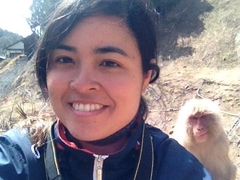
Rafaela Sayuri Takeshita
Associate Professor, Kent State University (former doctoral student & Research Associate)
Liesbeth Frias
I am interested in how variations in host community composition influence parasite transmission, especifically to what extent parasites are shared across primate hosts (in contrast to being host-specific), whether parasites correlate with/ influence host community structure, and the relationship between habitat fragmentation and both primate and parasite biodiversity. To approach these questions, I am surveying (gastrointestinal) parasite community assemblages in a multi-host system of primates living sympatrically in the Kinabatangan River (Malaysian Borneo). Ultimately my research aims to enhance basic understanding of community level epidemiology involving primates and their parasites in current landscapes for application in wildlife health monitoring, conservation and management, and public health awareness related to parasite transmission between wildlife and human populations.

Liesbeth Frias
Postdoctoral Fellow, Nanyang Technological University (Graduate of the Doctoral Course)
Elio Borghezan
I am a doctoral student interested in animal behavior and evolution. I have been investigating mate choice and divergence in secondary sexually-selected traits, particularly how they may affect mating partner recognition in an Amazon fish. Amazon has the highest freshwater faunal biodiversity in the world, and now I am trying to answer the following question: why does the Amazon have such high biodiversity? I am focused on how divergent selection can shape biodiversity in Amazonian rivers and how environment quality (different types of water) affects visual communication, especially sexual communication.
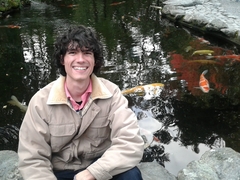
Elio Borghezan
Graduate of the Doctoral Course
Cecile Sarabian
How do animals living in environments where parasites are ubiquitous, avoid infection? With an evolutionary approach to hygiene and disgust, my research focuses on investigating parasite avoidance strategies in primates through field experiments, behavioral observations and parasitology. Better understanding infection-risk avoidance behaviors can have implications in both conservation and public health strategies by informing the design of interventions important in disease control.
Cecile Sarabian
Research Fellow, Institute for Advanced Study in Toulouse (former doctoral student & JSPS Postdoctoral Fellow)
Halmi Insani
Past effects of insularity on non-human primates have been a subject of my interest since the discovery of spectacular island effects on fossil humans. Comprised of a galaxy of islands and known as the home of various living non-human primates, the Southeast Asian Archipelago is my study area for investigating how non-human primates evolved, adapted, and survived throughout the islands since 2 million years ago. I have developed geometric-morphometrics analysis on craniodental elements of Macaca, Presbytis, Trachypithecus, Hylobates, Symphalangus, and Pongo, covering both living and fossil specimens.

Halmi Insani
Bandung Geological Museum (Graduate of the Doctoral Course)
Lucie Rigaill
My research focuses on investigating the forms and functions of primate multimodal sexual communication: how multiple female traits may signal reproductive status and individual characteristics and thus modulate male and female mating strategies and sexual competition (from signal content to signal perception). While my previous work has taken me to study mainly non-human primates, my latest project focused on human sexual communication. Overall my research aims at better understand the evolution of sexual communication in primates.

Lucie Rigaill
Lecturer, Université Paris Nanterre (Graduate of the Doctoral Course & former Research Associate)
Josue Alejandro
My main interest has been in social and housing enrichment in primates, and how these can ameliorate stress in captive conditions. Although I prefer to see wild animals living in nature, I think it is also very important to study animals in captive environments and learn as much as we can from them. The previous experiences helped me to decide to dedicate my graduate studies in learning more about the primate’s natural behavior, what various factors can affect their stress levels, and how we can measure well-being in a non-invasive ways, for both captive and non-captive primates. In my future studies I plan to look at the primate’s stress levels in various housing conditions while looking at their behaviors, general biological functioning, and hopefully assess a clearer picture of their welfare status. Future plans also include studying wild populations in Japan and other countries in Asia.
Josue Alejandro
Researcher at Kyoto University (Graduate of the Doctoral Course)
Duncan Wilson
My main interests are in animal psychology and animal welfare. My research focuses on understanding how non-human primates perceive faces and facial expressions using computer-based tasks (e.g., matching-to-sample, dot probe and visual search). I am also interested in whether facial expressions can be used to assess emotional and welfare states in animals. I lecture on Comparative Psychology, Primate Behaviour and Cognition, and Science Communication at the Institute for Liberal Arts and Sciences, Kyoto University.
Duncan Wilson
Lecturer, Kyoto University (Graduate of the Doctoral Course)
Sofi Bernstein
Currently, my research interests include the study of signal systems in non-human animals, particularly vocal communication in non-human primates. My work integrates bioacoustics and cognitive ethology, and I mostly focus on the Macaca genus. I participate in an ongoing collaboration with Anhui University and Central Washington University at the Valley of the Wild Monkeys,China where longitudinal data is being collected on a free-ranging troop of Tibetan macaques.
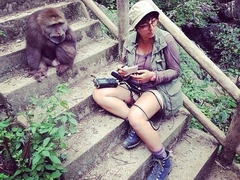
Sofi Bernstein
Graduate of the Doctoral Course
Tianmeng He
Primates are important herbivores in many ecosystems. They are not only influenced by the plants they eat but also influence the ecosystem through eating plants. I am interested in how the properties of food influence the digestion of primates. Meanwhile, I am also interested in the ecological impact of primates. I was focusing on the effects of diet composition, and dietary toughness on chewing and digestion in Japanese macaques when I was a graduate student in PRI/Inuyama campus.
Tianmeng He
Postdoctoral Fellow, Chinese Academy of Sciences (Graduate of the Doctoral Course)
Jie Gao
I’m generally interested in comparative cognitive science. My previous work was to investigate the understanding of a circular relationship in chimpanzees, our closest relatives, by training them the rule of the rock-paper-scissors game. I found some interesting response by chimpanzees to chimpanzee hands and human hands, and it led me to my current project: body perception in chimpanzees. Bodies are the direct agent of animals to explore and to interact with the environment. Bodies also convey important social cues. I’m interested in how animals (chimpanzees) perceive bodies, and their knowledge about body structures and body parts.
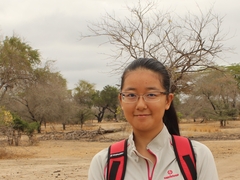
Jie Gao
Program-specific Assistant Professor, Kyoto University (former doctoral student)

Anastasiia Kovba
Graduate of the Master's Course
Dr. Julie Duboscq
- PhD in Natural Sciences (Dr. rer.nat.), University of Göttingen & University of Strasbourg. Financial support: Volkswagen Foundation and Primate Conservation Inc.
title of thesis: “Social tolerance: novel insights from wild female crested macaques, Macaca nigra”,...

Dr. Julie Duboscq
Researcher (CNRS-France) [previous JSPS Postdoctoral Fellow]
Naoko Hakuto
I am so happy to be a member of CICASP, here at PRI. I am enjoying myself as an administrator and am so greatful to have a chance to meet people from all over the world. I imagine that living in a different country or enviroment takes a lot of energy (and maybe some courage!) to get yourself settle into the new life, no matter where it is. But, please do not worry about that! We are always here for you to help and support all of you to feel comfortable and enjoy your new life in Japan, so please do not hesitate to call on us! You are always welcome to talk to and visit us here at CICASP. I am lookinp forward to meeting with you in the near future!

Naoko Hakuto
Former Administrative Staff Member (2020-2025)
Valéria Romano
• Evolution of social behavior • Behavioural ecology • Agent/Individual-based modelling • Social network analysis • Complex systems • Wildlife epidemiology • Animal conservation

Valéria Romano
Postdoctoral Fellow, French National Research Institute for Sustainable Development (former JSPS Postdoctoral Fellow)
Gema Palacino-González
- Psychological bases of social bonding between conspecifics
- Social behavior and communication of horses
- Evolution of cooperative behavior
- Joint commitment process
- Unmanned aerial vehicles

Gema Palacino-González
Doctoral Student
Vanessa Gris
Currently, I am investigating facial expressions and behaviors associated with pain in Japanese macaques and marmosets
- Anesthesia and analgesia of domestic and nondomestic species
- Animal Welfare - study on pain expressions
- Pharmacology of anesthetic drugs
- Evolution of nociception
- Conservation Medicine
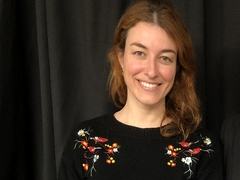
Vanessa Gris
Graduate of the Doctoral Course
Himani Nautiyal
Born and brought up in the Indian Himalayas, my research focuses on conserving this fragile ecosystem and the wildlife in it. My long-term research interests are behaviour, ecology, and conservation of primates living in the Himalayas. My PhD research is focused on understanding the social system and reproductive strategies of Central Himalayan langur (Semnopithecus schistaceus) in high altitude forests of Western Himalayas, India. By Studying this primate species past four years in different forest types in the elevation range of 1,500 to 4,000 meters, I have developed core interest towards understanding their adaptation in harsh climatic conditions.

Himani Nautiyal
Postdoctoral Associate, Howard University/National Institute of Advanced Studies (Graduate of the Doctoral Course)
Srishti Tripathi
How are emotions and moods embodied in the brain? And how has this evolved in animals and humans? These are interesting reserch questions to explore for many reasons. My research aims to explore the biological mechanisms underlying emotion and its related disorders, and its evolution in primates. My current research investies the underlying neural mechanisms (or neural networks) of grief and mourning using near-infrared spectroscopy brain imaging techniques in humans and non-human primates.

Srishti Tripathi
Graduate of the Doctoral Course
Mohamed Saidi
Rhinos are one the largest living mammals in the world facing many risks driven by human activities, notably illegal trophy hunting. These iconic megafaunas are now living in small and fragmented sub-populations exhibiting poor reproductive ability and higher inbreeding, which threaten their survival. We can save this flagship species from the brink of extinction through collective efforts.
Kyoto University provides me with an exciting platform to study one of the critically endangered species of rhinos—the black rhinoceros—with a focus on understanding their current genetic diversity using captive individuals to generate scientific information that is crucial for their survival and conservation.

Mohamed Saidi
Graduate of the Master's Course
Yuri Kawaguchi
What makes it possible for us to take care of infants? Given that it requires a lot of cost on caretakers, there could be physiological and/or psychological mechanisms that drive us to do so. I'm studying cognition in both human and non-human primates. My research interest is how primates recognize infants of their own species versus those of other species. I am investigating it by studying attention, preference, face recognition ability, etc. in humans and apes. I hope my work will contribute to revealing the evolutionary basis of infant care.

Yuri Kawaguchi
Newton International Fellow, Nottingham Trent University (former doctoral student)
Claire F. I. Watson
Socially transmitted behaviours form the basis of culture. I am especially intrigued by social and communicative cultural variation in non-human primates. My research involves empirical, behavioural studies on captive monkeys. I investigate primate social cognition, in particular social influence on social behaviours and traditions. Other avenues of research include vocalisations in common marmosets and improving primate welfare through enrichment.

Claire F. I. Watson
(former CICASP Research Associate)
Michael Huffman
The various research interests and fields I have played a role in pioneering, inspired by the primates I have observed and the people I have worked with, include cultural primatology, female mate choice, primate host-parasite ecology, and animal self-medication. These studies have led to work in ethnobotany, reproductive physiology, behavioral endocrinology, phylogeography, and historical primatology. Along with investigations on free-ranging and captive Japanese macaques for over 40 years, I studied wild chimpanzees at four field sites in Tanzania and Uganda between 1985 and 2004. Since 2004, I've been working mostly on macaques and langurs across Asia, with field studies in Sri Lanka, Taiwan, India, Indonesia and Vietnam.

Michael Huffman
Associate Professor, former CICASP Director
Tetsuro Matsuzawa
Dr. Tetsuro Matsuzawa is the founding director of CICASP, and a professor in the Department of Behavioral and Brain Sciences, Section of Language and Intelligence. His work in the laboratory at PRI is known as the "Ai project", named after the chimpanzee (Ai) that has been the focus of this pioneering research for more than 29 years. Dr. Matsuzawa has complemented the Ai project with observation of and field-experimentation with the chimpanzee community at Bossou, Guinea, West Africa, since 1986. This research encompasses the synergy of laboratory and field research, and aims to develop a comprehensive and holistic understanding of chimpanzee cognition.
